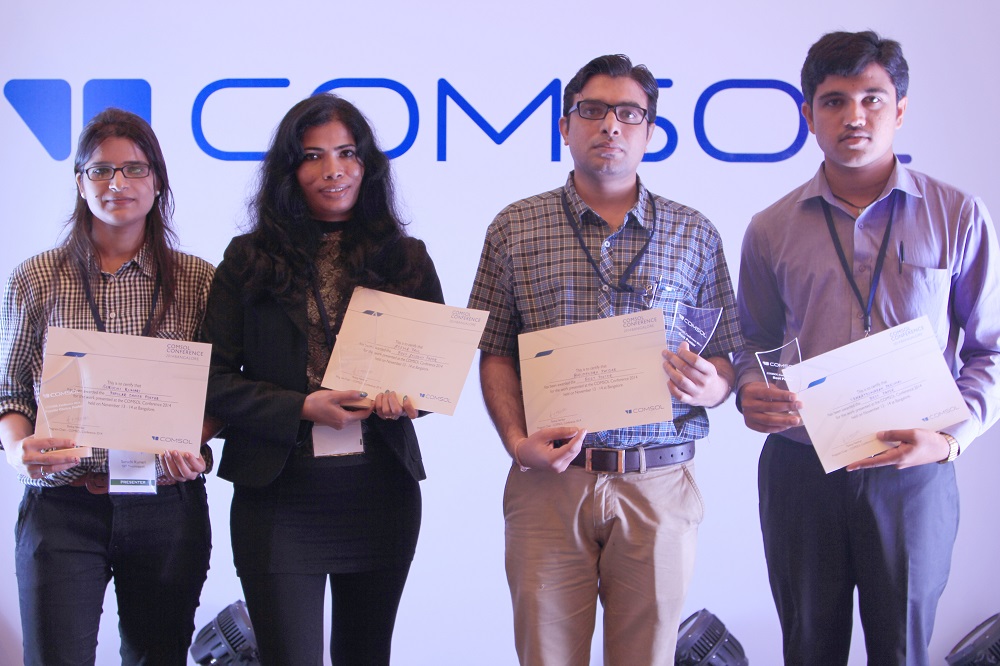
The COMSOL Conference 2014 Bangalore brought together many users from various parts of the world, giving them the opportunity to present their work and ideas, network, and socialize. All of the posters and presentations presented at the conference were fantastic and truly deserving of recognition. The program committee was faced with difficult decisions in selecting the best papers and posters from each category. Here are this year’s winners.
Best Student Poster
Ms. Seema Paul from The Royal Institute of Technology won the Best Student Poster award for her poster entitled “Hydrodynamics of Lake Victoria: Vertically Integrated Flow Models in COMSOL Multiphysics”. This poster explained her project goal to improve the water quality of Lake Victoria, the largest tropical lake in the world.
Ms. Paul’s poster outlined that the hydrodynamic processes in the shallow water system are unique due to the lake’s close proximity to the equator, making Coriolis effects noticeable for vertical transport. In order for her team to devise management strategies for the lake’s natural resources, a model of circulation patterns, dispersion, mixing, and stratification was needed.
The authors employed a modeling approach with COMSOL Multiphysics, as previously collected data was scarce and old. Results of long-time simulations, as well as numerical experiments with other approximate flow models, were presented in the poster. The team is currently using COMSOL Multiphysics to develop interfaces that can be used by the geo-hydrodynamical community.
Best Poster
The award for Best Poster went to Mr. Bhupendra Patidar from Bhabha Atomic Research Centre. His poster titled “Simulation and Experimental Validation of Direct Heating of Dhruva Fuel Rod for β Heat Treatment” described how his team used COMSOL Multiphysics to help determine the feasibility of the direct heating of a Dhruva fuel rod used in β heat treatments.
As explained in the poster, Mr. Patidar used COMSOL Multiphysics to model and simulate the direct heating of uranium rods of varying sizes (900 mmL x 12 mm φ and 1200 mmL x 50 mm φ). The team then made a prototype to validate simulation results. It turned out that experimental results closely matched the simulation results. Additionally, Mr. Patidar’s poster included different methods used for phase change analysis during modeling.

COMSOL Conference 2014 Bangalore presentation winners pose with their awards.
Popular Choice
The recipient of the Popular Choice award is one that is determined by conference attendees. Ms. Suruchi Kumari from the National Institute of Technology, Tiruchirappalli won this award for her poster titled “Biological Effects of Microwave Radiation”.
Ms. Kumari’s poster described how microwave technologies are used in therapeutic applications such as cardiology, surgery, urology, ophthalmology, and cancer therapy. Microwave radiation, however, affects biological systems at low exposure levels. When microwave radiation penetrates biological tissue, it is converted into thermal energy.
With a goal of understanding the phenomena occurring within the human body, Ms. Kumari and her team developed detailed COMSOL Multiphysics models of heat absorption and temperature distribution. Their work showed temperature gradients, current densities, electric field distributions, and total power dissipation due to electromagnetic waves within different parts of the body.
Best Paper
Mr. Rishabh Malav from the Indian Institute of Technology, Madras and Dr. Venkateswaran Perumal from Siemens were the recipients of the Best Paper award.
Their paper “Utilization of COMSOL Multiphysics® Java API for the Integration of Composite Material Module with a Customized User Interface” detailed their success in creating a graphical user interface (GUI) that enables users to integrate composite material properties into COMSOL Multiphysics. The GUI can be used with any model to perform simulations that include composite material properties.
Congratulations to the Winners
We would like to congratulate everyone who presented at the COMSOL Conference 2014 Bangalore. Similar to previous years, this year’s event was truly a success. We are eager to see more new ideas and applications from COMSOL Multiphysics users at next year’s conference.



Comments (0)